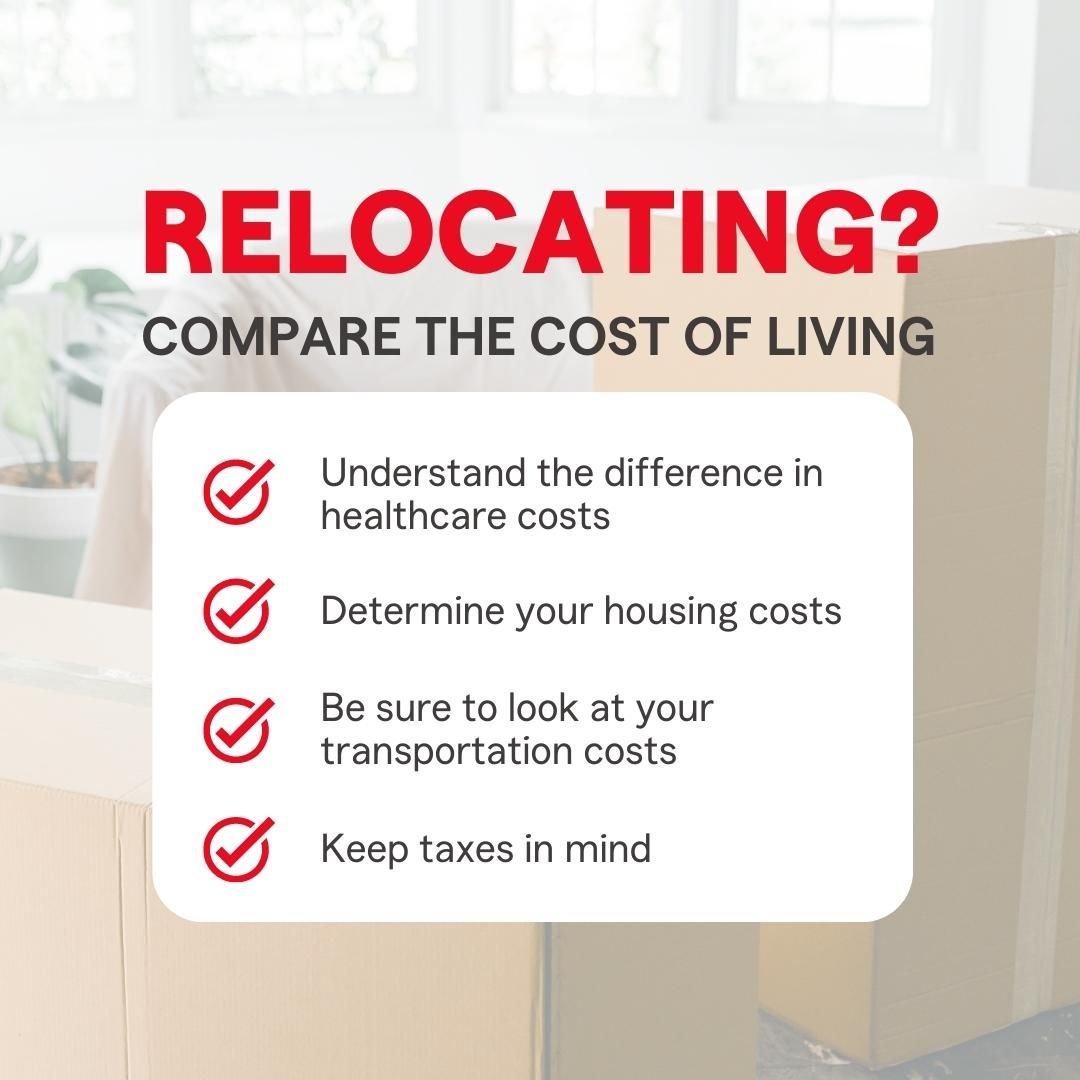Escape To The Country: Things To Consider Before You Relocate

Table of Contents
Financial Considerations: Budgeting for a Rural Lifestyle
An escape to the country often conjures images of idyllic farmhouses and rolling hills, but the reality involves a careful assessment of your finances. Successfully navigating a country relocation requires a realistic budget that accounts for the unique financial landscape of rural living.
Property Prices and Taxes
Country properties can vary wildly in price, depending on location, size, and condition. Research average costs in your target area and remember to factor in property taxes, which can be significantly different from urban areas. These differences can be substantial, impacting your overall budget.
- Check local council websites for tax information: This is the most reliable source for accurate property tax rates.
- Consider potential renovation costs: Older properties, while often charming, frequently require more maintenance and repairs. Budget accordingly for unexpected costs.
- Factor in potential hidden costs: Rural properties might have wells and septic systems, which require regular maintenance and occasional costly repairs or replacements.
Cost of Living
The cost of everyday essentials can be surprisingly higher in rural areas. Increased travel distances for work and shopping translate into higher fuel and vehicle maintenance costs. Grocery options might be more limited, leading to higher prices. Utilities, particularly heating, can also be more expensive.
- Research average grocery bills and compare to your current location: Websites and local forums can provide valuable insights into the cost of living in your target area.
- Calculate commuting costs: If you'll need to travel for work, factor in the daily or weekly fuel costs, wear and tear on your vehicle, and potential tolls.
- Investigate internet and cell phone service availability and costs: Reliable internet and cell service can be a challenge in rural areas, and costs can be significantly higher than in urban areas.
Lifestyle Changes: Adapting to Rural Living
Relocating to the countryside involves more than just a change of address; it's a significant lifestyle shift. Understanding and embracing these changes is key to a successful transition.
Commute and Transportation
Rural areas often lack extensive public transportation. Assess your commuting needs and whether owning a car is essential. Factor in fuel costs, car maintenance, and insurance. The distance to your workplace, schools, and other essential services will significantly impact your daily routine.
- Explore carpooling options: Connecting with fellow commuters can help reduce transportation costs and environmental impact.
- Consider the distance to essential services: The nearest hospital, schools, and shops might be further away than you are used to.
- Research local transportation options: While limited, some rural areas offer bus services or ride-sharing options.
Community and Social Life
Rural communities are often tight-knit, offering a strong sense of belonging. However, they can also feel more isolated than urban environments. Consider how you'll build social connections and whether the slower pace of life suits your personality.
- Attend local events and fairs: This is a great way to meet people and get a feel for the community spirit.
- Research local clubs and organizations: Joining groups based on your hobbies and interests will help you build relationships and integrate into the community.
- Consider the proximity to friends and family: Maintaining connections with loved ones is crucial, even after relocating.
Practicalities: Ensuring a Smooth Transition
Moving to the country requires attention to practical details that can make or break the experience. Careful planning in these areas will ensure a smoother transition.
Employment Opportunities
Rural areas may have fewer job opportunities than urban centers. If you're not self-employed or working remotely, secure employment before relocating. Research the job market in your target area and network with local businesses.
- Research local employment prospects in your chosen field: Online job boards and local newspapers can provide insights into the job market.
- Network with local businesses and community members: Networking can lead to unexpected opportunities and valuable connections.
- Consider the potential for freelance or remote work opportunities: The rise of remote work offers more flexibility for those seeking a country lifestyle.
Essential Services
Access to healthcare, education, and reliable internet can be limited in rural areas. Thoroughly research the availability and quality of essential services before making the move. This will prevent unpleasant surprises after relocation.
- Check the distance to the nearest hospital and schools: This is particularly crucial if you have children or require regular medical attention.
- Investigate internet service providers and their reliability: Reliable internet access is increasingly important for work and communication.
- Consider the availability of other essential services: Think about access to veterinary care, dentists, and other important services.
Conclusion
Escaping to the country can be a dream come true, but thorough planning is essential for a successful transition. By carefully considering the financial implications, lifestyle changes, and practicalities involved, you can minimize stress and maximize your chances of a fulfilling life in your new rural haven. Start planning your perfect escape to the country today by researching your chosen location and addressing the key points outlined above. Remember, a well-planned country relocation is a rewarding experience!

Featured Posts
-
 Discover Joy Crookes New Song Carmen
May 24, 2025
Discover Joy Crookes New Song Carmen
May 24, 2025 -
 Frances National Rally Le Pens Sunday Demonstration Falls Short Of Expected Show Of Force
May 24, 2025
Frances National Rally Le Pens Sunday Demonstration Falls Short Of Expected Show Of Force
May 24, 2025 -
 Frankfurt Stock Exchange Dax Ends Day Below 24 000
May 24, 2025
Frankfurt Stock Exchange Dax Ends Day Below 24 000
May 24, 2025 -
 Amundi Dow Jones Industrial Average Ucits Etf A Guide To Net Asset Value
May 24, 2025
Amundi Dow Jones Industrial Average Ucits Etf A Guide To Net Asset Value
May 24, 2025 -
 Atfaq Washntn Wbkyn Aljmrky Artfae Mwshr Daks Alalmany Ila 24 Alf Nqtt
May 24, 2025
Atfaq Washntn Wbkyn Aljmrky Artfae Mwshr Daks Alalmany Ila 24 Alf Nqtt
May 24, 2025
Latest Posts
-
 Philips Future Health Index 2025 Urgent Call To Action For Healthcare Leaders
May 24, 2025
Philips Future Health Index 2025 Urgent Call To Action For Healthcare Leaders
May 24, 2025 -
 Ai In Healthcare Key Findings From The Philips Future Health Index 2025
May 24, 2025
Ai In Healthcare Key Findings From The Philips Future Health Index 2025
May 24, 2025 -
 Philips Future Health Index 2025 Ais Transformative Impact On Global Healthcare
May 24, 2025
Philips Future Health Index 2025 Ais Transformative Impact On Global Healthcare
May 24, 2025 -
 Heinekens Strong Revenue Growth Positive Outlook Persists Despite Tariff Headwinds
May 24, 2025
Heinekens Strong Revenue Growth Positive Outlook Persists Despite Tariff Headwinds
May 24, 2025 -
 Heineken Revenue Surpasses Projections Outlook Remains Strong Despite Trade Challenges
May 24, 2025
Heineken Revenue Surpasses Projections Outlook Remains Strong Despite Trade Challenges
May 24, 2025
